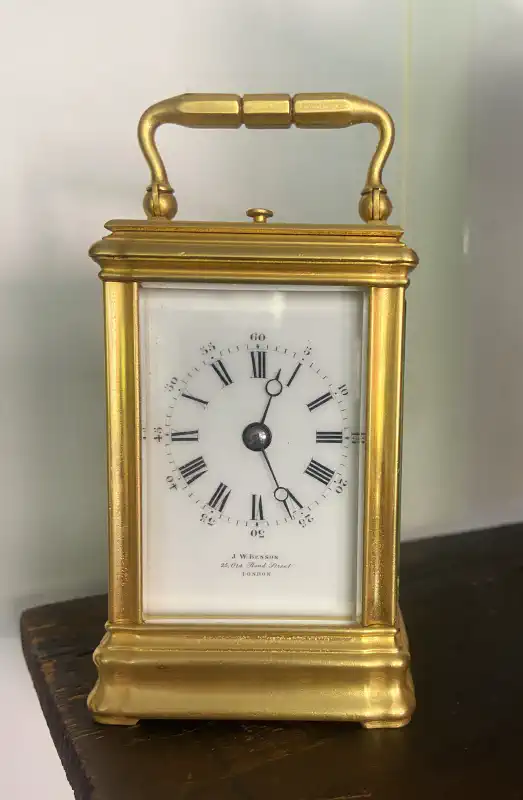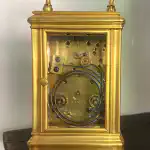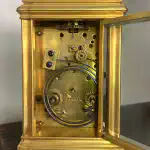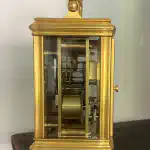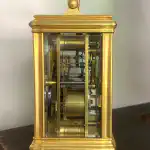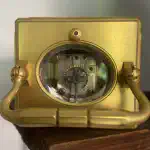Small carriage clock
- Height:
- 13.5cm handle up; 10.5cm handle down
- Maker:
- Benson
- Price:
- £1750
A lovely eight-day striking and repeating carriage clock, signed by the retailer on the enamel dial J. W. BENSON 25, Old Bond Street LONDON, c. 1870.
The superb gilt-brass gorge case has bevelled glass panels to all sides, so that the movement is almost entirely visible. The top has an oval window through which the original silvered brass platform escapement can be seen.
At the back there is a glazed door giving access to the winding and setting arbors. The clock is surmounted by a typically shaped carrying handle.
The rectangular enamel dial has a Roman chapter ring with an outer minute track with Arabic five-minute markers. The time is indicated by a fine pair of blued-steel Breguet hands. The retailer has marked the dial in the following manner J. W. BENSON 25, Old Bond Street LONDON.
The spring-driven eight-day movement of this lovely small carriage clock is constructed between plates. The going train has an English lever escapement on a gilt platform with hairspring balance and regulation. It can be adjusted by a regulator pin which can be seen through the window in the top and is accessible through the back door. The striking indicates the hour fully and the half hours with a single stroke on a gong. In addition, it has a repeat button at the top, with which the last hour struck can be repeated at will.
The clock is in excellent condition.
Note on the retailer:
The prestigious firm of J.W. Benson was one of the most respected watchmakers in London during the second half of the 19th Century.The business was originally set up by brothers James William Benson and Samuel Suckley Benson who advertised themselves as watchmakers, gold and silversmiths of Cornhill in the City of London. As well as manufacturing their own watches and jewellery, they were also importers and retailers dealing in fine diamonds, gold and silver ware. After just eight years the partnership was dissolved in 1855 and J.W. Benson carried on alone. He took on additional premises at 33 Ludgate Hill and as the business grew, he added no. 34 next door. By the 1860s he was advertising his large and richly stocked shop with adjoining workshop specialising not only in the manufacture of watches and clocks but also in their repair. He began to participate in both national and international expositions including London in 1862, Paris in 1867 and the Inventions Exhibition of 1885 at which he unveiled the ‘Patent Dust and Damp Excluding Band for Watches’.In 1872 a shop was opened on Bond Street which was followed by one in the Royal Exchange in 1890 as well as a new steam powered factory in La Belle Sauvage Yard, close to the premises in Ludgate Hill. In 1878 J.W. Benson died leaving his sons Alfred and Arthur to continue the business. The following year they were awarded a Royal Warrant by Queen Victoria to which they would add those of the Prince of Wales and the Kings of Siam and Denmark. Whilst best known for their timepieces, the firm also sold jewellery and by the 1880s were incorporating platinum into their gold and diamond set jewels.
In 1889 the company took over the firm of Hunt & Roskell and continued successfully until WWII when their factory was bombed and they ceased manufacturing. However, they continued as retailers for many years, with adverts from the late 1950s showing beautiful selections of diamond and gem-set rings for sale at the Bond Street store. They were eventually bought out by Mappin & Webb in the 1980s.
Interested in this clock?
Send an email or leave a message and find out if it is still available!
